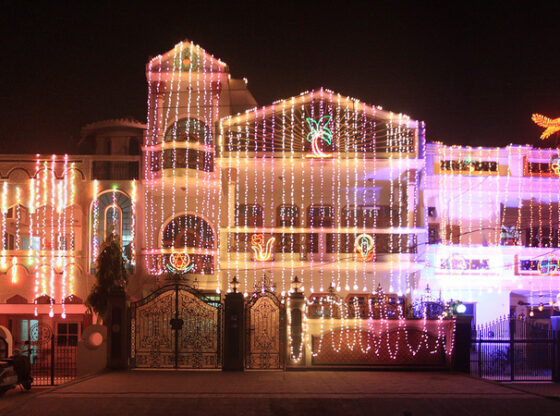Diwali in Mauritius turns the island into a fairyland. For 1 night everyone celebrates the Festival of Lights which is another famous Hindu attraction. Houses, gardens and buildings are adorned with clay lamps, candles and electric lights. The night sparkles with fireworks to ward off evil spirits. This year Diwali will be celebrated on 31st October 2024.
Diwali, based on the Hindu luni-sidereal calendar, symbolizes the triumph of good over evil and is celebrated on the night of the New Moon in the month of Kartik. Having ancient roots as a harvest festival, Diwali, loosely translated from Sanskrit as “a row of lights,” holds significant cultural importance, especially in Mauritius.
Diwali is such a big festival that it’s celebrated over a 5 day period, although only one day is officially recognized as a public holiday. Diwali conveys a profound message of embracing the forces of light over darkness and the victory of good over evil. Central to the festival is the worship of the goddess Luckshmi, the consort of the god Vishnu, who, according to legend, took the form of a human to aid her husband in combating malevolent forces.
A prominent narrative within the festival’s lore revolves around Rama, the seventh incarnation of Vishnu, and his wife Sita. Amidst adversity, including Sita’s abduction by a demon, the eventual triumph of good over evil ultimately leads to Rama and Sita’s triumphant return to their kingdom, marked by the townspeople illuminating the kingdom with countless oil lamps.
In Mauritius, the celebration is marked by the pervasive adornment of lights on buildings and temples, reflecting the festivity’s essence of illuminating darkness. Preparations for Diwali commence well in advance, as households are thoroughly cleaned and decorated, symbolizing the welcoming of positive energy and renewal. The custom of acquiring new clothing and bestowing gifts on loved ones is also prevalent, with men often acquiring specially tailored suits, and women acquiring new saris for the occasion.
Cleaning the home includes decorating the ground with colourful patterns in sacred patterns. Cakes and delicacies are carefully wrapped to be shared with friends and relatives. Sharing the cakes are a sign of harmony and love.
Diyas, oil lamps are lit as are candles and lanterns. Fireworks are discharged to chase away evil spirits. Families celebrate with festive meals and it is customary to exchange sweets such as mithai.
People crowd the streets making it almost impossible for cars to pass. Traditional songs are played and people greet each other enthusiastically. Temples are decorated lavishly and many families attend special services to celebrate Divali.
If you are a tourist and would like to enjoy the festival, you can either take a walk around town or book some tour agency to take you to all the fancy places.
